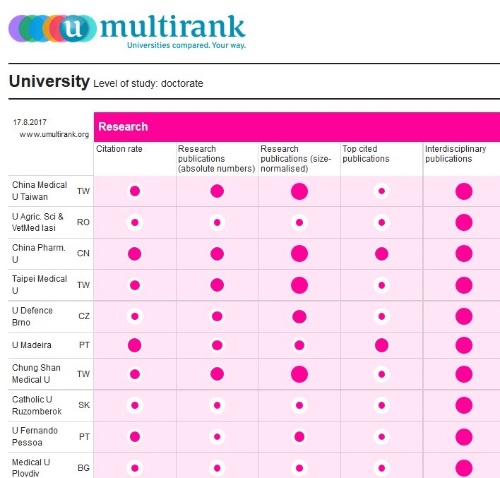Measures that matter - Interdisciplinary publications

Ranking universities by interdisciplinary publications
One of the indicators we regard as very innovative in U-Multirank – the largest university ranking in the world - is the interdisciplinarity indicator. Its inclusion as one of the research indicators in these world raknings is driven by our aim to show an additional characteristic of an institution’s research. When people want to assess the research performance of a university they often look at bibliometric indicators such as citation rates, or the number of a university’s research publications that belong to the top 10% most frequently cited publications worldwide. While these are important indicators, there is more to research performance than just these. Important scientific discoveries these days often take place at the intersection of different disciplines. And many of today’s societal challenges are wicked problems that are multidisciplinary in character, requiring the use of methods and insights from several established disciplines. Studying global warming for example involves ecological systems, human behaviour, energy science, political science and more.
Therefore, the multidisciplinarity of research reflects its innovative character. Using our large database of scientific publications per university, U-Multirank looks at the reference lists of the university’s publications. All the references in these lists belong to one or more Web of Science scientific fields (if they belong to more than one, we distribute them using fractional counting). There are many such fields, with some being very close to one another and others further apart. In this way, the references of each publication may be distributed across a range of fields. The degree of interdisciplinarity of a publication is minimal if all references belong to the same scientific field. The larger the spread of references across various fields and the weaker the relationship between these fields, the higher the degree of interdisciplinarity of a particular publication. Taking into account all the publications of a university, U-Multirank computes the degree of interdisciplinarity of a university’s research publications.
Observing the interdisciplinarity scores for all institutions covered in U-Multirank we can conclude that this indicator is really quite different to any of the traditional research indicators such as citation rates or Nobel prizes won. Some well-known Business Schools that score highly on our citation rate indicator (e.g. London Business School and Hanken School of Economics) actually score relatively low on the interdisciplinarity indicator. And so do some of the technical universities (e.g. Hong Kong U Science & Tech and Telecom Paris Tech). This result may be expected in cases of relatively specialised institutions. But some of the large comprehensive universities also have moderate interdisciplinarity scores (e.g. Peking, Cape Town and Tokyo universities). A number of medical universities show a high degree of interdisciplinarity (e.g. the School of Hygiene and Tropical Medicine in London), and so do some technical universities (e.g. Chalmers, TU Berlin, TU Eindhoven). The top 10 performers in terms of interdisciplinary institutions are shown below. This once again shows the sometimes surprising results of U-Multirank. The research output of China Medical U Taiwan is the most interdisciplinary of all institutions covered in U-Multirank, followed by U Agric. Sci & Vetmed Iasi in Romania and China Pharm. U in China . The table shows that there is no immediate relationship between citation rate and interdisciplinarity score.
In short: U-Multirank reaches elements that other rankings have not yet reached, highlighting dimensions of performance and research quality not included elsewhere.




